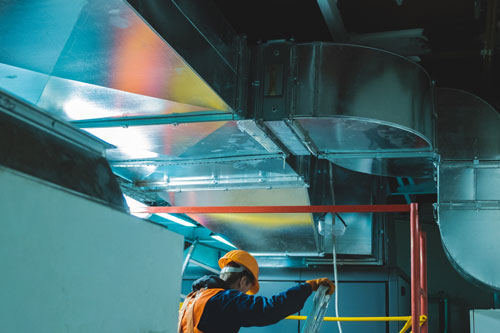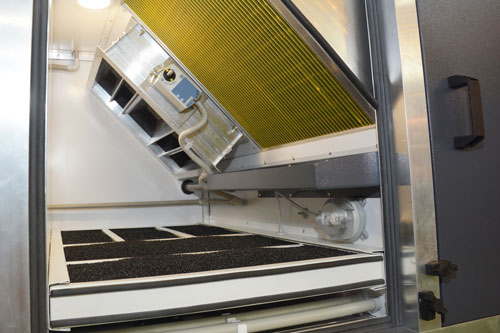We understand you are committed to protecting the health and safety of your employees, especially during the coronavirus pandemic. This is why we at Vanport Mechanical and Fire Sprinkler are sharing steps you can take to create a safe and healthy workplace as recommended by the Centers for Disease and Control.
According to researchers at the CDC, it’s recommended that building managers use a layered strategy to help mitigate SARS-CoV-2 exposure, which is the virus that causes COVID-19. This could include improving ventilation, in addition to social distancing, face mask use, and personal hygiene tactics.
SARS-CoV-2, the virus that causes COVID-19 is spread more readily indoors than outdoors as the concentration of the particles dissipates with wind. When outdoors, even a very light breeze can help reduce the concentration of the viral particles. It can be helpful to recreate this atmosphere in your office building by improving your indoor ventilation and working to create a “natural wind.”
Ready for a quote?
Click below to leave your information and we will call you back in 30 minutes or less!
Schedule your free estimate today!
Leave your information below and we will call you in 30 minutes or less.
*During normal business hours. After hours calls will be returned the next business day.
CDC Air Quality Guidelines for Businesses
Below is a list of ventilation strategies to help reduce the concentration of viral particles in the air, including SARS CoV-2. Consider working with the HVAC professionals at Vanport when looking to improve the ventilation in your building. This includes:
- Increasing the total airflow supply to occupied areas
- Disabling demand-control ventilation controls (DCV)
- Increasing air filtration without diminishing airflow
- Inspecting filter and filter housing
- Incorporating natural ventilation such as open windows and doors
- Using fans in windows to increase the effectiveness of open windows
- Running the HVAC system at maximum outside airflow for 2 hours before and 2 hours after the building is occupied
- Increasing the percentage of outdoor air by as much as a 100%
- Re-evaluating how supply and exhaust dampers and air diffusers are positioned
- Ensuring restroom fans are operating properly and at full capacity
- Decreasing building occupancy or roof occupancy when outdoor ventilation cannot be increased
- Using ultraviolet germicidal irradiation (UVGI) to inactivate potential airborne viruses when the ventilation cannot be increased
- Using portable HEPA filtration systems
Keep in mind, these are strategies to help mitigate and reduce exposure to viruses, but they will not eliminate the risk completely. They also come with a wide range of costs, including operating costs, in addition to risk assessment parameters including community incidence rates, room occupant density, and facemask compliance expectations. Read the CDC Ventilation in Buildings to learn more about recommendations for ventilation requirements for office buildings.

Commercial Air Purification
Air purifiers are great to have in your space year-round as they help reduce allergens, pet dander, pollen, dust, and mold spores. Helping reduce these particulates from your space will improve your indoor air quality, promote a healthy environment, and can help reduce breathing conditions and health issues.

Commercial Air Filters
Commercial HVAC systems are used in a variety of settings from industrial buildings to retail spaces. They not only keep you comfortable by providing you with cool and warm air, but they also help improve your indoor air quality by utilizing commercial air filters. If you’re in need of new commercial air filters for your space, contact Vanport Mechanical Fire & Sprinkler Inc.
FAQs:
Can COVID-19 be transmitted through HVAC systems?
Researchers say not enough is known right now to be certain if SARS CoV-2 is spread through ventilation systems.
What is “directional airflow” and how should it be used to prevent COVID-19?
Directional airflow is a technique where air movement flows in a clean-to-less clean direction to mitigate the risk of airborne contaminants.
Does a HEPA filter help prevent the spread of COVID-19?
According to CDC research, HEPA filters are no less than 99.97% effective in capturing viral particles associated with SARS CoV-2.
Can HVAC filters capture the COVID-19 virus particles?
A MERV 13 filter is at least 50% effective in capturing particles in the 0.3 µm to 1.0 µm size range and at least 85% effective in capturing particles in the 1 µm to 3 µm size range. The particle size of SARS CoV-2 is around 0.1 µm, however researchers say this virus doesn’t travel through air by itself, it is typically spread through respiratory droplets.
Are You Meeting Your Ventilation Requirements?
We at Vanport Mechanical want to help you maintain a safe and healthy workplace. For professional HVAC help optimizing your building’s ventilation and indoor air quality, contact us. We can help you evaluate the new CDC criteria and determine the best way to adjust your system.
Commercial Air Quality Requirements in Vancouver WA and Portland OR
Serving The Greater Vancouver WA and Portland OR Areas
Longview | Kelso | Kalama | Battle Ground | Hockinson | Washougal | Camas | Salmon Creek | La Center | Orchards | Mill Plain | Brush Prairie | Woodland | Ridgefield | Cascade Park | Hazel Dell | Felida | Yacolt
Portland | Beaverton | Happy Valley | Clackamas | Troutdale | Hillsboro | Forest Grove | Tualatin | Lake Oswego | Gresham | Milwaukie | Oregon City
Home » Commercial HVAC Services » Commercial Air Quality Requirements
